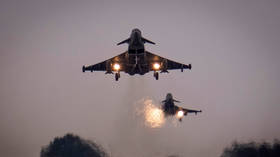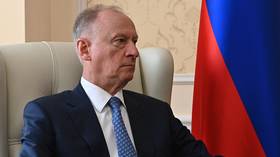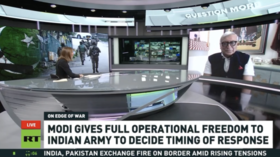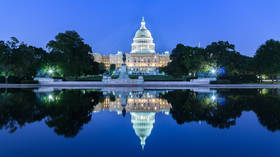Former US ambassador perpetuates myth that it’s ‘not safe’ for American tourists to go to Russia
American tourists or students who were considering taking a trip to Russia should probably strike it from their bucket lists, as former US ambassador Michael McFaul has warned on Twitter that it is no longer safe.
This, of course, is total nonsense.
Yet, in a sensational Twitter post on Wednesday, McFaul used the arrest of Paul Whelan — an American arrested for suspected espionage in Moscow — to suggest that traveling to Russia poses a safety risk to American tourists in general.
I often get asked if it’s safe to travel to Russia as a tourist or student. I always used to say yes, and with enthusiasm. After Whelan arrest, however, I will change my advice.
— Michael McFaul (@McFaul) January 2, 2019
In reality, Russia is as safe for American tourists (or any other tourists, for that matter) as any other European country is — and the fact that a former official who really should know better is perpetuating the myth of deep, dark, dangerous Russia is utterly ridiculous.
In the tweet, McFaul said that while in the past he “always used to say yes” enthusiastically when asked if Russia was safe, after Whelan’s arrest, he has decided to change his advice. Miraculously, the arrest of one American seems to have changed everything. It is unlikely, however, that McFaul issued similar advice to his Russian friends after the arrest of Russian citizen Maria Butina, who last year was accused of acting as a foreign agent in the United States without proper registration.
"Butina isn’t being treated as a spy... she's accused only of unofficial diplomacy and lobbying at conferences, dinners and other events that were by no means clandestine." https://t.co/aYC67gvGw6
— Aaron Maté (@aaronjmate) December 14, 2018
Imagine if it was assumed that Butina’s arrest meant the US was suddenly unsafe for Russian tourists in general. That assumption would never, ever be made — and it’s not because the US is some kind of crime-free paradise where justice reigns supreme.
No, it’s because of endless and tiresome double standards imposed on Russia by both US officials and the media. It’s always one assumption for the US and another for Russia; Whelan is an American arrested in Moscow, so he must be innocent (and Russia must be dangerous), but Butina was a Russian arrested in Washington DC, so she must be guilty (and the US is simply seeking justice). Facts and evidence become irrelevant in the rush to compound the ‘correct’ narrative.
Also, relative silence of US government on Paul Whelan arrest perhaps means there might actually be a small chance he was conducting espionage? US media (and corespondents in Moscow) presume his innocence, but presume guilt of Russians arrested under similar suspicions in US.
— Bryan MacDonald (@27khv) January 3, 2019
Right on cue, some in the media rushed to capitalize on McFaul’s dodgy guidance, with one article warning that Americans “might not be safe” in Russia despite the State Department “only” issuing a 'Level 2' travel advisory for the country. A ‘Level 2’ warning, by the way, already advises tourists to exercise “increased caution.”
There luckily was some more pushback against McFaul, with Syracuse University professor Brian Taylor putting things into perspective, noting that more than 150,000 Americans travel to Russia every year and they aren’t all getting locked up for spying.
Over 150K Americans go to 🇷🇺every year. The risk of dying in a car crash, in 🇺🇸or while in 🇷🇺as a tourist, are much higher than the risk of being arrested as a spy. I know that's no comfort to Whelan, but let's keep things in perspective. Traveling to 🇷🇺is still very safe. pic.twitter.com/1OAL776MtY
— Brian Taylor (@bdtaylor_SU) January 2, 2019
Unfortunately, however, this concept that Russia is unsafe for tourists isn’t exactly new and was doing the rounds in Western media well before McFaul weighed in with his two cents. In 2015, Russia was listed as the 11th most dangerous country in the world above places like Yemen and Libya in a bizarre Western ranking, which I deconstructed at the time.
I have personally traveled to about 13 different Russian cities from St. Petersburg in the West to Vladivostok in the Far East — and some very remote places in between — so I have a fairly solid grasp of how tourists (hailing from anywhere) fare in the country. In fact, it’s probably a better grasp than McFaul has, since his experience as a US government official is hardly indicative of how most visitors experience the country. His view might also be colored by the fact that he was placed on a retaliatory sanctions list and banned from entering the country in 2016.
Of course, there are always going to be moments when you feel apprehensive in a foreign country. Immediately after the Paris attacks in 2015, I remember feeling a general sense of apprehension in big public spaces like metro stations and shopping centers in Moscow, but this is nothing unique to Russia. I can honestly say there was never a time when I felt that I was in a scary or especially dangerous place. In fact, I felt safer walking on Moscow streets after dark than I did in Washington D.C. or Budapest — two other places I lived for a while.
Also on rt.com Michael McFaul called out on trying to whitewash Obama's support for Saudi ArabiaNow, I'm not an American, so I can't say with absolute certainty that I would not have been hauled off to some secret Siberian gulag for unsuspecting American tourists if I was, but I'm going to go out on a limb here and say I would have been fine — just like all the Americans I regularly saw enjoying themselves without being handcuffed and accused of espionage.
Just imagine it. If Russia, for example, was experiencing mass shootings on the scale that the US does, the State Department would likely issue a stark travel warning about the level of societal violence in big, bad, scary Russia. If we’re being totally honest, you’d probably be more justified in advising black people not to travel to the US due to a clear police bias against African Americans in the country than you would be telling Americans to skip Russia because one guy was arrested for alleged spying.
About two years ago, in a restaurant in St. Petersburg (which ranks as the world’s best cultural destination, by the way), a Russian waitress told me that she would love to travel to the US, but she hadn’t bothered even applying for a visa because she was afraid Americans would automatically be “suspicious” of her as a Russian. If the constant stream of negativity toward Russia (and Russians in general) in American mainstream media is anything to go by, she is also more justified in that assumption than McFaul is in advising Americans that Russia is not safe.
Two weeks ago, a British woman posted a Twitter thread about her Christmas trip across Russia on the Trans-Mongolian railway from Moscow to Beijing. It involved stunning scenery, friendly locals, good food, extremely cold weather — and believe it or not, a wonderful time was had and nobody seems to have gotten arrested.
Last night we caught the Trans-Mongolian railway from Moscow to Beijing pic.twitter.com/jIZ1dmXRBC
— Katie Glass (@katieglassST) December 24, 2018
The thread is a must-read for anyone wanting to know what travel in Russia is really like, minus the sensationalized Western media portrayals. It’s a real shame that some Americans who otherwise might have made the journey, will miss out thanks to such unwarranted fear.
Here’s the beautiful cups we got to make our tea and chocolate on the train ❤️ pic.twitter.com/dUu9Cz0ehq
— Katie Glass (@katieglassST) December 25, 2018
The statements, views and opinions expressed in this column are solely those of the author and do not necessarily represent those of RT.















